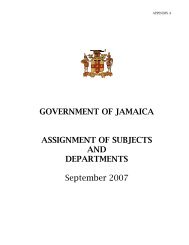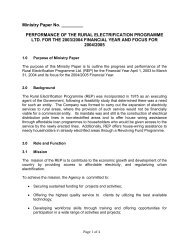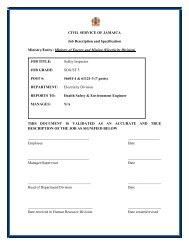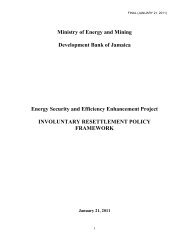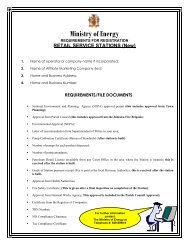Jamaica Biofuels Report - Ministry of Energy
Jamaica Biofuels Report - Ministry of Energy
Jamaica Biofuels Report - Ministry of Energy
You also want an ePaper? Increase the reach of your titles
YUMPU automatically turns print PDFs into web optimized ePapers that Google loves.
purchased in some form from elsewhere. Because <strong>of</strong> these and other factors, as the tableindicates, the cost <strong>of</strong> ethanol from cassava is generally higher than from sugar cane. However, itdoes <strong>of</strong>fer a possible way to extend the operational use <strong>of</strong> a distillery to full year.Petrobras invested in a cassava mill during the period <strong>of</strong> 1978 to 1983, but Brazilian experiencewith ethanol from cassava since then is limited. Although there is room, in all likelihood, forincreased productivity, as has occurred with cane in the past, the average yield <strong>of</strong> cassava inBrazil is only 20 t/ha. Also, according to Felipe and Alves (2007), it is very difficult to averagemore than 20% starch in cassava over a season. At those rates, about 100 L <strong>of</strong> ethanol could beproduced annually per hectare under pilot and laboratory conditions.New varieties <strong>of</strong> cassava are being developed, and while it is worth more as food, someprocessing residues could be used economically to produce ethanol. Before cassava can beconsidered for commercial application in <strong>Jamaica</strong> a number <strong>of</strong> challenging issues need to beevaluated by local field trials and a number <strong>of</strong> other factors taken into account:• Cassava can be produced in a wide range <strong>of</strong> soil types and conditions, but like any othercrop, it responds positively to better practices. Sandy soils are better than loam soilsbecause <strong>of</strong> the development <strong>of</strong> the rhizomes with less soil resistance. It is a robust cropcapable to produce even in quite low technology conditions.• Experience growing cassava in similar conditions to <strong>Jamaica</strong> involves food production ona small scale, so it has to be tested under local conditions.• Preprocessing requirements, such as enzymatic or acid hydrolysis to break down thestarch into fermentable sugars before it can be fermented and fed to a distillerydesigned primarily for sugar cane, with some process adjustments• Supplemental fuel requirements for processing. While above ground parts <strong>of</strong> the plantcould theoretically supply some fuel, these are likely to be needed to provide naturalhumus for the restoration <strong>of</strong> the soil.• Storage requirements and seasonal factors for year-round continuous processing.Cassava may have an application in <strong>Jamaica</strong> as a crop that can be stored in piles or asdried chips to provide feedstock when sugar cane is out <strong>of</strong> season.2.3 BiodieselCastor• CharacteristicsCastor is a perennial plant that grows wild in many locations and is well adapted to poor soils,so it commonly appears as a weed among other crops. As such, the economical growth <strong>of</strong> thiscrop <strong>of</strong>ten needs more care than most farmers are willing to provide for the attainable return.For success, it needs a suitable fertilization program, proper soil preparation, weed control andother good practices.19




